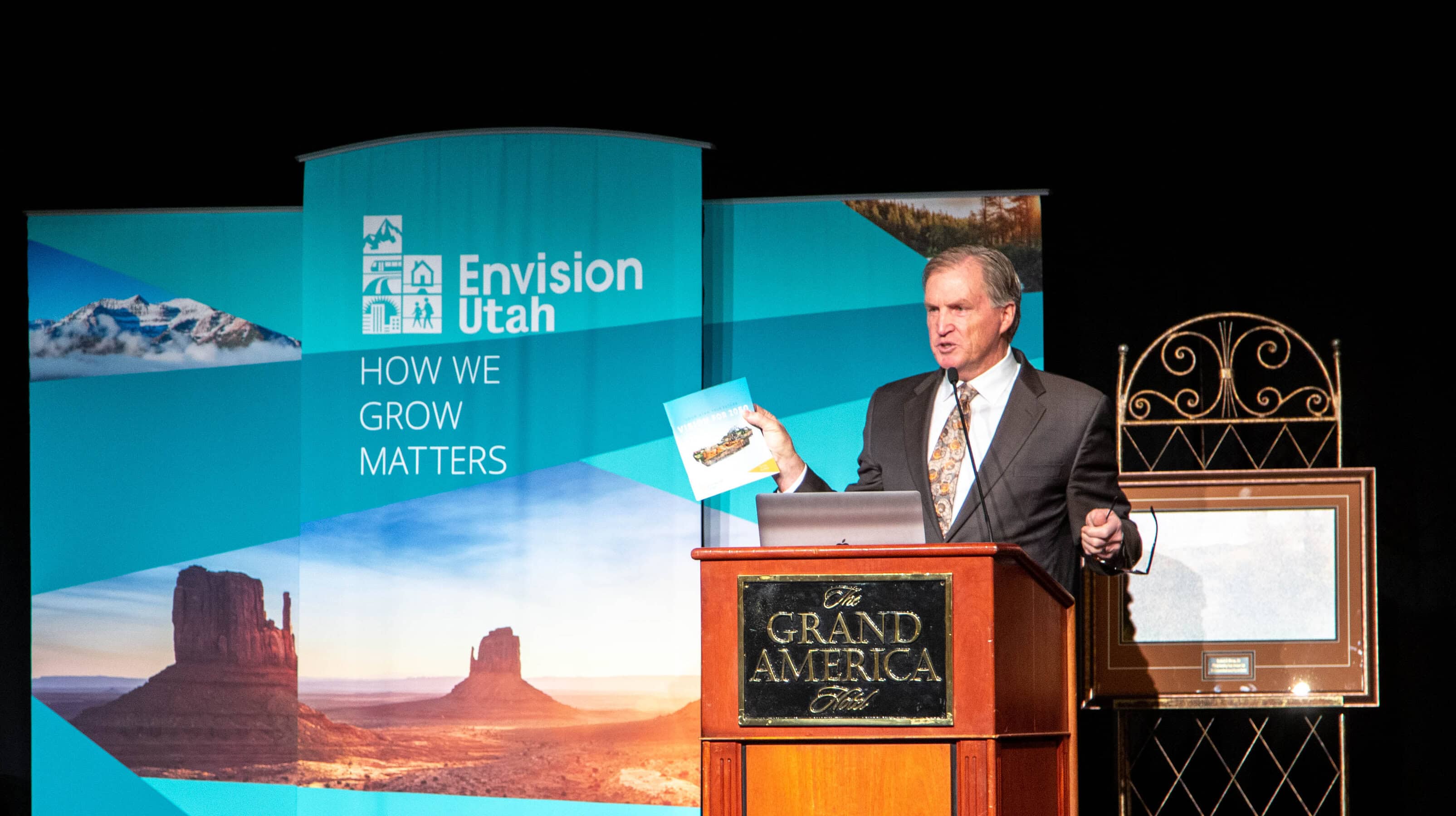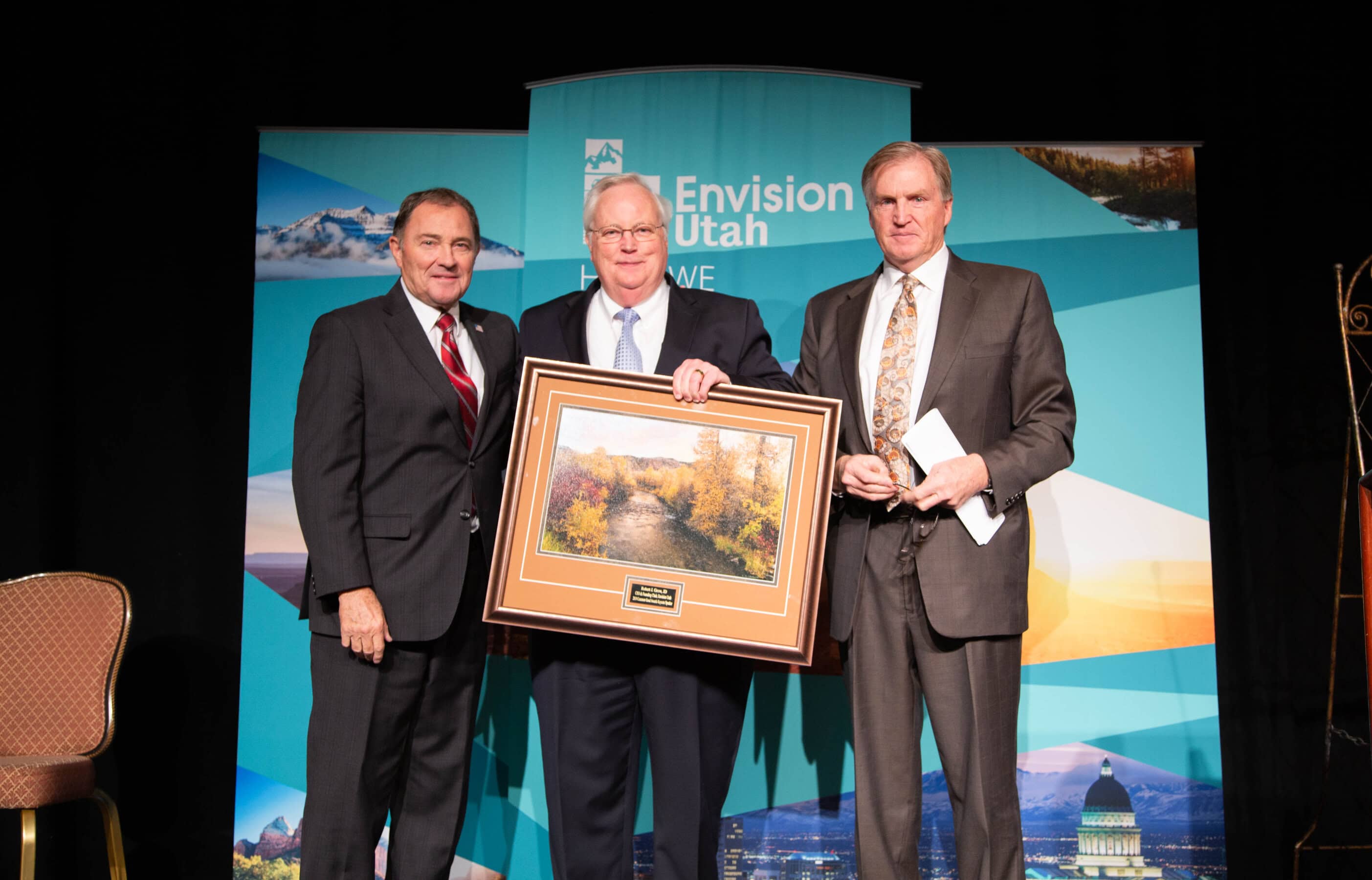Share
Governor Herbert among those honored at Envision Utah luncheon in celebration of the state’s collaborative spirit
SALT LAKE CITY — As a longtime leader in Utah’s construction industry, Jacobsen Board of Directors Chairman Lonnie Bullard has always recognized the value of aligning the interests of business with that of other important community stakeholders in order to achieve a common vision for the future of the state.
It’s for this reason that Bullard, who also formerly served as CEO of Jacobsen, saw a good thing in Envision Utah shortly after it was founded more than 20 years ago and soon joined as a member of its board. He felt the group had the potential, through surveys and other research, to zero in on a few very important questions facing the state.
“What did Utahns really value?” Bullard said, recalling the most pressing questions. “And then what are the challenges? And how do we make decisions as to growth?”
Since 1997, Envision Utah has convened a diverse group of stakeholders that collaborate on how to responsibly shape the state’s future according to its residents’ most highly prioritized quality of life metrics. These stakeholders include elected officials, business leaders, conservation groups, educators, transportation experts, developers and more.
In that spirit of working together across differences, Envision Utah hosts its Common Good Awards luncheon each year to give recognition to individuals and organizations that embody the state’s collaborative ethos and strive to make its communities safer, kinder, healthier, and more prosperous. Bullard, who is now the chairman of Envision Utah’s Executive Committee, emceed the 2019 Common Good Awards on Dec. 3 at the Grand America Hotel in Salt Lake City, honoring recipients Utah Governor Gary Herbert; Salt Lake daycare nonprofit Neighborhood House; and Marathon Petroleum, Chevron Corporation, Sinclair Oil Corporation, and Silver Eagle Refining, Inc.
The four refineries, Bullard said, were recognized for going above and beyond Environmental Protection Agency (EPA) standards in agreeing to create what is known as “Tier 3 fuel” at their Utah facilities. This change in their production processes is expected to result in substantial benefits for Utah’s air quality, but is also extremely expensive for those companies.
“It costs hundreds of millions of dollars to scrub that gas,” Bullard said. “It’s a meaningful upfront contribution. So that’s why they were selected to be Common Good Awards recipients — they didn’t have to do that, and they did it.”
Tier 3 fuel can help cars run cleaner and benefit Utah’s air, Bullard said, which is especially important since “tackling cars is the biggest deal of all” in terms of protecting air quality in the state.
“We had scientists from Utah State and from the University of Utah who brought us all kinds of things as to what would produce the biggest results. And Tier 3 fuel was top on the list and is the single biggest contributor to clean air over a long period of time,” he said.
EPA research shows the Wasatch Front could stand to benefit from the adoption of Tier 3 fuel more than anywhere else in the country, Bullard added, making the refineries’ commitment to the change even more meaningful. Bullard praised Governor Herbert for emphasizing the strong need for Tier 3 fuel in Utah in conversations with refinery leaders.
“The governor met with each of these refinery heads personally and said, ‘Listen, we need you to deliver Tier 3 fuel to Utah,’” Bullard said.
Governor Herbert was recognized as a Common Good Awards recipient, Bullard said, because of the way he has proactively sought to follow through on the guiding principles of growth identified by more than 52,000 Utahns who were surveyed in recent years as part of Envision Utah’s Your Utah Your Future initiative.
Bullard lauded the other 2019 Common Good Awards recipient — Neighborhood House, a Salt Lake City nonprofit offering daycare, preschool, and adult daycare services to families in need — as a critically important resource which richly deserves recognition for improving its surrounding community.
“Neighborhood House is a great not-for-profit that’s been around more than 100 years, and they’re trying to help reduce poverty and intergenerational poverty specifically,” Bullard said.
Jacobsen believes strongly in recognizing those who come together to find solutions improving Utahns’ quality of life, and was proud to be a Gold Sponsor of this year’s Common Good Awards.
“There is a culture of collaboration in Utah,” Bullard said.
Bullard said careful and strategic planning for growth and its challenges, particularly when done with large groups with different interests working together, is advantageous for recruiting businesses to the Beehive State.
“It’s good from an economic development standpoint, if we can tell outside companies that we’re trying to grow as smartly as we can,” he said.
In particular, Bullard added, having such a diverse group of organizations at the table at Envision Utah lends strong credibility to its conceptualizations of what Utah’s future could and should look like.
“It started with the idea that hey, we’ve got to have a group that looks at the entire Wasatch Front from an overall planning standpoint. So we bring all these groups together, we produce vision studies, we look at transportation, we look at housing growth, we look at the types of housing, all kinds of things,” he said. “And then these policymakers from Riverton, for example, will go home and they’ll have this stuff to look at. And they’re able to look beyond their boundaries and see how they relate to Herriman, for example, and how they relate to other places.”
As a company dedicated to Making Life Better, Jacobsen is grateful to Envision Utah for the leadership it has demonstrated in forecasting a future all Utahns can get excited about, outlining the road map as to how to get there, and bringing together all kinds of different groups responsible for getting it done.

